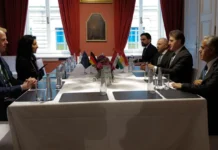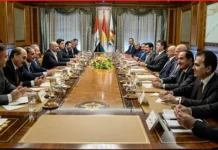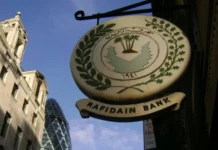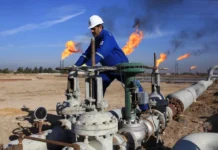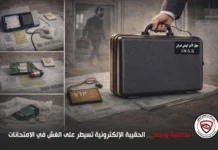Mogadishu Refinery Find Triggers Iraq’s Hunt For $100B In Lost Global Assets
Iraq Jawad Al-Samarraie May 30, 2025 AL Rafidain Bank branch in London, opened in 1954
Baghdad (IraqiNews.com) – A startling revelation at the Arab Summit in Baghdad this May has jolted Iraq into confronting a forgotten legacy: a sprawling international portfolio of properties and investments, potentially worth at least $100B, that has languished in neglect and obscurity for two decades.
The unexpected news of a large, Iraqi-built oil refinery still standing in Mogadishu, Somalia, has served as a dramatic wake-up call, triggering a renewed effort to trace and potentially reclaim these vast, squandered national assets.
The ghost refinery in Mogadishu, constructed in 1978 under a bilateral agreement and largely forgotten by Iraqi officialdom since 2003,
was brought back to Baghdad’s attention by Somali President Hassan Sheikh Mohamud.
He informed Iraqi Prime Minister Mohammed Shia Al Sudani that the facility merely requires technical rehabilitation to become operational – a timely prospect as Somalia begins exploring offshore oil.
This single revelation underscored a much larger, more complex issue: Iraq’s dozens of lost properties scattered across three continents.
During its oil-boom years in the 1970s and 1980s, Iraq strategically invested its wealth globally, acquiring an estimated 50 significant assets.
These included luxury palaces and real estate in prime European locations like Cannes, France, Spain, the UK, and Italy; agricultural ventures such as tea, rice, rubber, and tobacco farms in Malaysia, Sri Lanka, and Vietnam; and diverse holdings in Africa, from tourist islands and agricultural factories in Mozambique and Nigeria to the aforementioned Somali refinery.
This was a policy of extending economic and diplomatic influence.
However, following the 2003 regime change, this global portfolio fell into disarray.
Iraq’s Parliamentary Integrity Committee previously revealed to news agencies that crucial ownership documents were stolen or destroyed.
Some properties were illicitly transferred to individuals or shell companies linked to the former regime,
while others simply vanished from official oversight, becoming a forgotten treasure.
Early attempts at recovery highlighted the dangers.
In 2012, an Iraqi Foreign Ministry delegation dispatched to Mozambique to inspect a state-owned asset, believed to be a palace on a tourist island, received direct threats from an armed group controlling the site, forcing their immediate withdrawal.
The incident underscored the formidable challenges beyond mere legal claims.
The Mogadishu refinery news has now spurred the Iraqi government into decisive action.
Specialized legal and technical committees have been formed, and the Ministries of Oil, Foreign Affairs, and Justice are tasked with a coordinated global effort.
This includes attempting to re-register properties, settle outstanding tax issues,
and verify any remaining documentation.
Legal experts suggest Iraq could pursue claims through the International Court of Justice (ICJ) or negotiate bilateral agreements with host nations.
They also stress the necessity of pursuing individuals and entities involved in the illicit appropriation of these assets,
potentially through international arrest warrants via INTERPOL if sufficient evidence is available.
For a nation facing ongoing economic challenges and heavily reliant on oil exports, the potential recovery or proper investment of these assets, valued around $100B, represents a monumental financial opportunity.
Economists believe even partial success could generate sustainable revenue streams,
offering a vital diversification away from almost exclusive dependence on crude oil exports for its budget.
However, the path to reclamation is fraught with obstacles.
Experts caution that some assets may now be subject to statute of limitations in their host countries,
or may have been legally acquired by other parties during Iraq’s two-decade absence from active management.
Furthermore, concerns exist about potential internal political interference derailing recovery efforts,
especially if assets are now linked to influential figures or complex, decades-old contracts that would be difficult to unwind without triggering intricate legal disputes.
Despite these challenges, the surprise rediscovery of the Mogadishu refinery has ignited a new sense of urgency and hope.
The Iraqi government’s renewed commitment, if pursued with transparency, international cooperation, and persistence,
could potentially unlock billions in national wealth that has lain dormant across the globe for far too long, offering a much-needed boost to its economic future.
5. Image Alt Text Suggestions:
* “Archival photo of the Iraqi-built oil refinery in Mogadishu, Somalia”
* “Map highlighting locations of potential lost Iraqi assets across Europe, Asia, and Africa”
* “Somali President Hassan Sheikh Mohamud”
* “Iraqi Prime Minister Mohammed Shia Al Sudani”
* “Graph or visual representing the estimated $90 billion value of Iraq’s forgotten assets”
* “A dilapidated historic building representing a neglected Iraqi asset abroad”
https://www.iraqinews.com/iraq/iraqi-government-hunts-forgotten-global-assets-saddam-era/
Starting Tomorrow, Payment Cards From These Banks Will Be Suspended Abroad.
Economy 2025-05-31 | 07:22 16,893 views Alsumaria News – Economic Economic expert Munar al-Obaidi confirmed on Saturday that a large number of electronic payment cards issued by Iraqi banks will no longer work outside Iraq as of June 1.
This is due to changes in the mechanisms used to enhance the balances of these cards with global companies such as Visa and Mastercard. told Al-Obaidi Sumaria News,
“Cards belonging to government banks will continue to operate normally, and cards belonging to private banks that have accounts with US correspondent banks outside the country will remain active.”
He added, “The problem lies with cards issued by banks that do not have accounts with US banks, as
they are currently unable to top up their card balances, which leads to the cessation of their operations abroad.”
Al-Obaidi pointed out that “the Central Bank of Iraq is currently working on activating a temporary mechanism in cooperation with the Trade Bank of Iraq (TBI) to strengthen the balances of these banks until they open accounts in American banks,” stressing that “the final solution will come when these banks complete their procedures with their correspondent banks in the United States.”
According to Al-Obaidi, What’s going on?
“Since the end of 2022, payment cards have become one of the tools used to expel foreign currency from Iraq, especially given the price gap between the parallel market and the official dollar exchange rate, which has put significant pressure on foreign exchange reserves.”
According to the expert, estimates indicate that “foreign spending via cards has reached approximately $10-12 billion annually, a significant figure that has directly impacted the currency market.”
Central Bank Decision
Under pressure from this, the Central Bank of Iraq decided to amend its operating procedures.
Iraqi banks are now required to replenish their card balances in dollars exclusively through US correspondent banks, to ensure transparency and monitor the flow of funds.
However, because many private banks do not currently have such accounts, their cards will not be valid outside Iraq until further notice.
Al-Abidi confirmed that Is there a solution soon?
“banks are working to open accounts with US correspondent banks, but until that happens, the problem will remain.”
He called on citizens to “verify the type of card and the issuing bank, especially for those who rely on it for travel or online shopping abroad.”
https://www.alsumaria.tv/news/economy/528202/بدءاً-من-الغد-بطاقات-الدفع-لهذه-المصارف-تتوقف-خارج-البلاد
A Clear Monopoly And Binding Commissions.” Observers Warn Of Arab Banks’ Dominance Of Currency Sales.
Economy 2025-05-31 | 04:38 1,940 views Alsumaria News – Economic Economist Mahmoud Dagher confirmed on Saturday that Arab banks‘ takeover of the currency exchange window portends an economic catastrophe. ,”
Dagher told Sumaria News “Arab banks have come to dominate the currency sales window and foreign money transfer operations in Iraq, noting that “this came as a result of the series of US sanctions known as deprivation,
which Iraq strictly adhered to due to the great influence of the United States in the global financial system.”
He explained that “the new reality has opened the way for banks with foreign capital, some with Arab contributions, to work intensively in the field of money transfers,
especially after a number of Iraqi banks withdrew from this activity as a result of the sanctions,
which led to a vacuum in the arena that these banks exploited to their advantage.”
Dagher explained that “only two or three banks currently control money transfer operations,
which amounted to approximately $80 billion in 2024, which represents a severe concentration in the remittance market.”
He noted that “this concentration has led to the emergence of a clear monopoly, as these banks now
control trade and import financing operations in Iraq and impose commissions as they see fit, which has negatively impacted diversity and competition within the banking sector.”
He explained that “the state is aware of the seriousness of this situation and is moving toward reforming the banking sector,” warning that “any reform must be calm and thoughtful to avoid the creation of powerful financial blocs that monopolize transfer operations.” He stated, “The reform process cannot succeed if it is undertaken hastily or without taking into account market balance.
The goal must be to redistribute banking efforts more broadly and prevent a limited number of banks from monopolizing the market.” https://www.alsumaria.tv/news/economy/528178/احتكار-واضح-وعمولات-ملزمة-مراقبون-يحذرون-من-هيمنة-مصارف-عربية-على-بيع
For current and reliable Iraqi news please visit: https://www.bondladyscorner.com/


